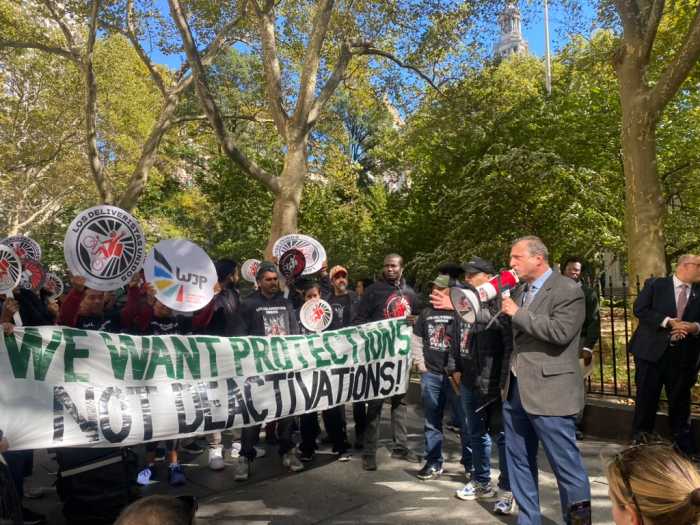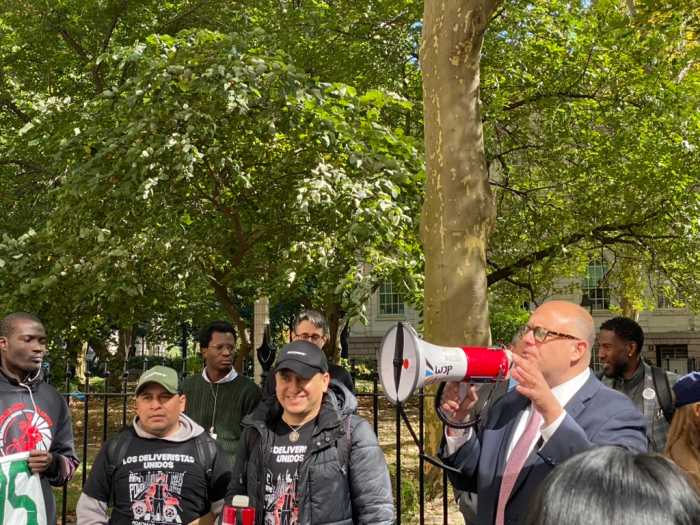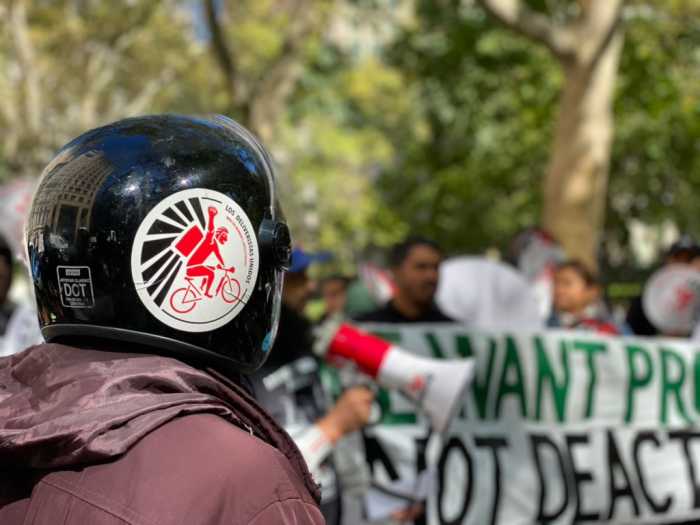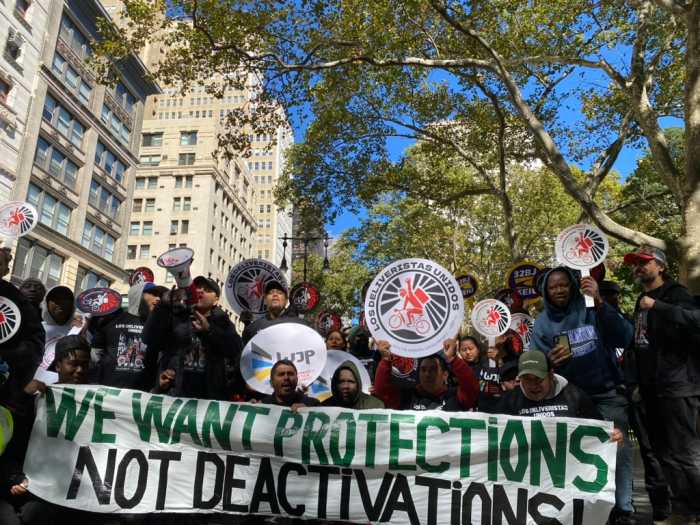Since March, Cossi Azonwakon has been attempting to get his Grubhub account reinstated after he was abruptly locked out of the app, he says, as a result of he took too lengthy with a supply.
Azonwakon, who started delivering for Grubhub in 2019 after transferring to New York from Benin, West Africa, in 2017, says the deactivation after six years with the meals supply firm has left him struggling financially.
“Since they deactivated my account, I keep looking for another job, but it’s not easy,” Azonwakon stated in an interview on Thursday. “I use only Grubhub to work. Now I can’t pay my rent or take care of my family.”
Azonwakon stated his account was closed after the corporate accused him of fraudulently attempting to extend his minimal pay. He believes the true problem was delays past his management, akin to site visitors, restaurant wait instances, and constructing entry, and that the corporate prefers to deactivate employees whose deliveries take longer fairly than addressing systemic points.
“Sometimes the order is not ready, or traffic is bad, or you have to use a service entrance,” he stated. “All this makes delivery longer. It’s not our fault. These companies blame us for anything that can affect their profit.”
Azonwakon stated he has filed month-to-month appeals since March however has acquired solely rejections. “They say they can’t open my account because there are more drivers in the city,” he stated. “I just want my app back so I can start work.”
He’s one in all a thousand deliveristas who’ve appealed deactivations with main food-delivery firms in current months, in response to Employees’ Justice Venture/Los Deliveristas Unidos.
Over 25 of them joined Thursday’s rally in Decrease Manhattan, calling on the Metropolis Council to move Intro. 1332, a invoice that will bar app-based firms from deactivating couriers with out simply trigger or discover, what they name algorithmic firings.
“We can no longer rely on the goodwill of the companies to ensure that workers get justice,” stated Ligia Guallpa, government director of Employees’ Justice Venture. “In the last four months alone, our organization has filed over a thousand deactivation appeals with Grubhub, DoorDash, and Uber. These companies have ignored them. That’s why we’re fighting for this lifeline bill to ensure job security and street safety.”
She stated the apps are pressuring employees to ship sooner and sooner, “making our streets unsafe, making this job one of the deadliest jobs in our city, but also exploiting workers.”
Employees’ Justice Venture and Los Deliveristas Unidos say app supply firms have “outsourced” their termination processes to AI – “algorithmic management” packages they are saying “ruthlessly” hearth employees arrange towards “impossible deadlines.”
Ligia Guallpa, government director of Employees’ Justice Venture, talking Thursday’s rally, highlighting over 1,000 deactivation appeals filed with Grubhub, DoorDash, and Uber in current months.
On the rally, supply employees from DoorDash, Uber Eats, and Grubhub shared comparable accounts of shedding their jobs with out rationalization.
“I worked for Grubhub for over four years,” one employee by the title of Shahadat stated. “They deactivated my account for no reason. I work in bad weather, at night, and they said my photo wasn’t clear. It’s ridiculous — so many of my friends lost their accounts for the same reason.”
One other speaker, Demusa, who drives for Uber Eats, stated he was accused of “fraud” with out proof and was locked out of his account in a single day.
“They treat us like we’re not human,” he stated. “We call for explanations, and they refuse to give any.”
José Lino Yos, a pacesetter with Los Deliveristas Unidos, stated each deactivation destroys a employee’s livelihood, and that Intro 1332 is about dignity as a lot as equity.
“Every unjust deactivation destroys the life of a delivery worker and their family,” Yos stated. “We lose safety, stability, and dignity. But today we say enough.”
 Metropolis Comptroller Brad Lander referred to as the spate of deactivations “punishment by billion-dollar corporations”Picture by Adam Daly
Metropolis Comptroller Brad Lander referred to as the spate of deactivations “punishment by billion-dollar corporations”Picture by Adam Daly  Brannan’s invoice would require app-based firms like Grubhub, DoorDash, and Uber to offer discover and an attraction course of earlier than deactivating deliveristasPhoto by Adam Daly
Brannan’s invoice would require app-based firms like Grubhub, DoorDash, and Uber to offer discover and an attraction course of earlier than deactivating deliveristasPhoto by Adam Daly
Brooklyn Council Member Justin Brannan, who launched the invoice, informed employees on the rally that town would stand with them.
“These billion-dollar app companies are billion-dollar app companies because of the men and women like you, the hard-working people that keep these apps going, and if an algorithm can fire you today for no reason, who’s to say that that algorithm can’t fire all of us tomorrow?” Brannan stated.
He pledged to the employees that the Metropolis Council would assist them and move laws to “make sure that the human beings behind this technology, that the human beings that make these billion-dollar app companies possible, have the worker protections that they deserve.”
The proposed regulation would cowl greater than 80,000 app-based couriers in New York Metropolis, requiring firms to offer written discover, documentation, and an attraction course of earlier than eradicating a employee from their platform.
If handed, the laws would require firms to offer employees, who’ve served a 30-day probationary interval, truthful warnings and graduated responses earlier than they’re completely deactivated — a 14-day discover for many lockouts and 120 days for financial layoffs. Firms would nonetheless be capable to instantly deactivate riders for “egregious misconduct.”
It will additionally guarantee firms present employees with efficiency information, buyer complaints, and comparative workforce information. Deliveristas attempting to problem a deactivation would have the opportunity to take action by way of abriation, casual decision, or a Division of Shopper and Employee Safety investigation.
Metropolis Comptroller Brad Lander attacked the meals supply firms, saying, “They just care about putting billions of dollars in their pockets.”
“Deactivation is punishment by multi-billion-dollar corporations because you have built enough power to win a living wage,” he informed the rally of employees, who he stated have confirmed they have been important employees within the metropolis through the COVID-19 pandemic.
“When Justin Brannan’s bill for deactivation protections has passed, they won’t be allowed to deactivate people just out of spite because they don’t want to pay a minimum wage,” he stated. “Workers will be protected and will have the ability to go to work every day, work hard, feed their families, and take care of each other, and that is what deliverirista power looks like.”
App Push Again
At a Sept. 12 Metropolis Council listening to on the invoice, representatives from Grubhub, DoorDash, and Uber urged lawmakers to revise or reject Intro. 1332, warning that the invoice might hurt eating places, customers, and even employees themselves.
In written testimony, Grubhub argued that “Int. 1332, as currently written, does not reflect the structure of app-based work and imposes significant operational and safety risks.” The corporate stated the invoice “borrows heavily from frameworks designed for fast food employment,” though app-based drivers “log on and off at will, work independently, contract with multiple platforms, and are not assigned to fixed locations or shifts.”
The corporate additionally warned that the required two-week discover earlier than deactivation would power platforms “to keep the individual active for an additional two weeks, despite already meeting our internal threshold for removal.” That, Grubhub stated, would “degrade service quality for diners and restaurants and disadvantage the thousands of drivers who consistently provide quality service.”

DoorDash raised comparable considerations, telling the Council that the invoice “could have unintended consequences for public safety,” as a 14-day discover requirement would make it tougher to take away drivers engaged in unsafe conduct or fraud.
The corporate additionally objected to language requiring disclosure of shopper complaints, writing: “Absent any safeguards, this could be read to require that platforms share specific details of an incident with someone who has engaged in violence or assault. This information could easily be used by a bad actor to locate and retaliate against a consumer who submitted the complaint.”
Uber additionally opposed the measure, calling for a narrower definition of “deactivation.” The corporate testified that “a 14-day mandatory notice period before account termination would create significant fraud and safety risks” and that “sharing detailed consumer reports could enable workers to identify complainants, putting their safety at risk.”
Uber added that deactivation is “a measure of last resort, applied only when necessary to protect the integrity of the platform and the safety of the workers, consumers, and businesses who rely on it.”
All three firms said that they assist “fairness” and “due process,” however urged the council to think about different fashions, akin to Colorado’s 2024 regulation, which requires warnings and appeals whereas nonetheless permitting rapid removing for critical misconduct.

She additionally emphasised that the present system just isn’t consultant of the realities confronted by many deliveristas, highlighting the deactivation of over 100 Grubhub deliveristas, principally from the Bangladeshi neighborhood, for logging into their accounts on a number of telephones.
“What they don’t know is that deliveristas have to use two phones in order to work from 7 a.m. to midnight,” she stated. “So, they lost their job for logging on to two phones, because the company didn’t know that deliveristas have to use two phones in order to work 12 hours a day.”






